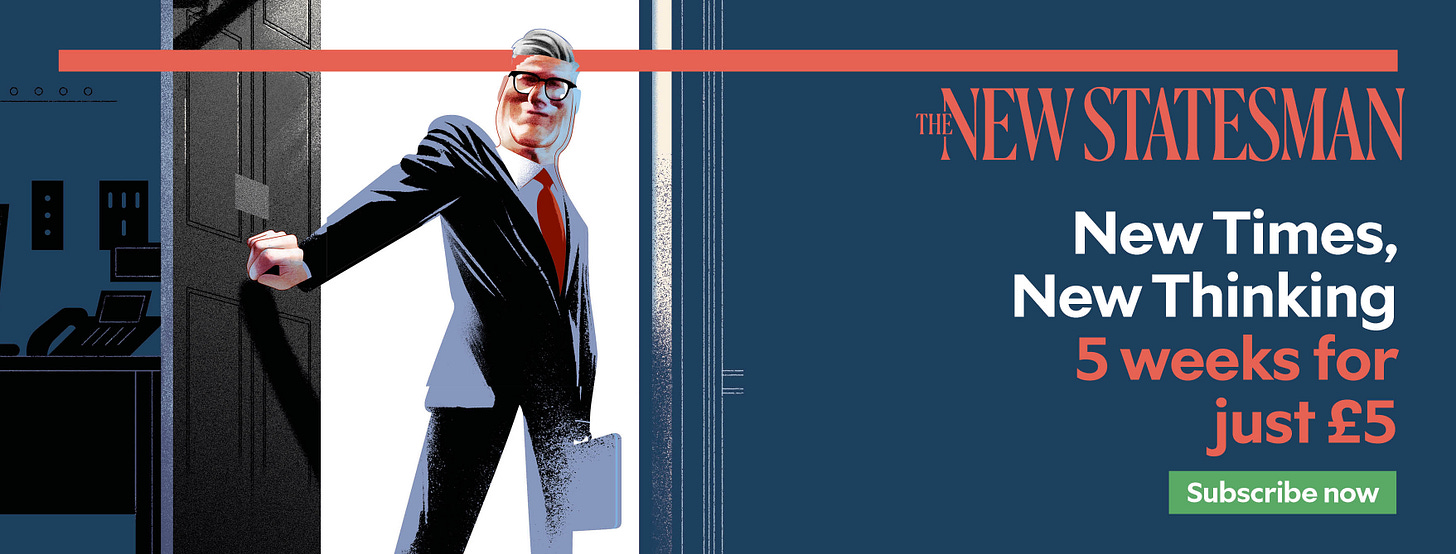Morning Call: Why Labour has embraced class politics
Starmer’s cabinet has broken with the model of the Blair years.
Good morning, it’s George here.
What story does Labour want to tell about itself? A year after the party entered office this question is still routinely asked. Below I explore why many in the cabinet are alighting on class – and whether it will work.
When a Vanity Fair interviewer asked Tony Blair about his faith, Alastair Campbell memorably interjected: “We don’t do God.” In some respects, New Labour didn’t do class either.
Blair treated the subject as redolent of a failed past and as increasingly irrelevant in modern Britain. John Prescott may never have said that “we’re all middle-class now” (he described himself as a “working-class man” living a “middle-class style of life”) but Blair did declare that “the class war is over” in his 1999 Labour conference speech.
Keir Starmer and his cabinet, by contrast, have embraced the politics of class. At last Friday’s Chequers away day, the Prime Minister reminded his team that they were the most working-class cabinet in history. While Blair used the language of peace, Starmer deployed the language of struggle. “You all have your own stories about the battle you had to get here,” he told the cabinet. “This is a time for fighters. You are here to remove the barriers for working people to get to where they want to.”
It’s a theme that Wes Streeting reprised in his extended (17-minute) speech at last night’s New Statesman summer party. “[Starmer] has assembled the most working-class cabinet in history and that really matters, not for tokenism but because of the experience we bring to bear,” he said. “If you don’t have a diversity of perspective and experience, you end up through unconscious, if not conscious, bias making decisions in the interests of the privileged few.” (Blair, Streeting told me last year, was “too quick to declare a classless society”.)
It isn’t only Starmer and Streeting who speak the language of class. Their cabinet colleagues routinely connect their policy decisions to their backgrounds. When Bridget Phillipson – last night’s other guest speaker – announced the expansion of free school meals to all households receiving Universal Child she recalled the hunger she endured in her youth.
At last month’s Spending Review, the comprehensive-educated Rachel Reeves declared that she would “always prioritise” the 93 per cent of children who attend state schools as she defended the imposition of VAT on private school fees (a decision of which Blair is said to disapprove).
What else lies behind this turn towards class? In part it reflects a grim policy reality: though New Labour lifted half a million children out of poverty and dramatically improved public services, class differences endured and in some areas even hardened (not least housing).
It also reflects a transformed electoral landscape: Blair’s project was shaped by winning over middle-class voters in the south of England; Starmer has had to be far more attentive to the working-class voters who abandoned Labour in the “Red Wall” and Scotland (and who, as Morgan McSweeney understands, began to drift away during Blair’s third term).
Can class help Labour tell the story that so many feel this government still lacks? It can – and should – correct the perception that this cabinet merely represents “more of the same”.
As I note in my column in this week’s magazine, the relationship between the government and the trade unions, to take one example, has been transformed (when he became Business Secretary, Jonathan Reynolds found that his department lacked even the phone numbers of some general secretaries).
Confronted by Nigel Farage – a Dulwich College-educated stockbroker – plenty in Labour draw heart from the return of class politics. But while the government needs a compelling story, its fate may ultimately hinge on delivery. If voters don’t feel better off by the next election, then Labour’s invocations of class will fall just as flat as its “toff” attacks on David Cameron and Boris Johnson did.
George’s picks
In this week’s cover story, former Supreme Court judge Jonathan Sumption concludes that Israel is guilty of war crimes.
Rachel on why the Afghan data debacle was the last Tory landmine for Labour.
Freddie explores Labour’s quest for a tech deal with Trump.
Will on a taxing issue: HMRC does not know how much billionaires pay.
From our partners
Cybersecurity vendors are key in enabling organisations to place responsible disclosure at the core of their operations, writes regional director, UK & Ireland, at Fortinet, Richard Woolfrey.
Mailshot
Times: £7bn cover-up for Afghanistan leak, evacuation and injunction
Independent: Inflation unexpectedly hits 3.6 per cent
Guardian: Man who murdered Peter Falconio dies without revealing body
Daily Echo: Southern Water announces hosepipe ban
Polly Toynbee: We should worry about teenage pregnancies
Alice Thomson: We must do more for our trees
Louisa Thomas: Wimbledon in the age of Sincaraz
And with that…
Let me know what you think about today’s Morning Call by hitting reply. My thanks to Zoë Huxford and George Monaghan. Have a good day, I’ll be back tomorrow.
George — @georgeeaton









Have they though? Both Reeves and Philipson went to Oxford, both have been steeped in politics from a young age. Since the age of 18 or so, their lives have been very similar to people with more privileged childhoods. They may have a recollection of working class and lower middle class upbringings, but they only ever seem to use them as prolier than thou cred when it suits them. Starmer is the same.
Good for them for having got to where they are, but let's not pretend they spent any part of their adult lives cleaning or working in warehouses.
I don't think the working class are any more fooled by any of this than they were in 1995 when Pulp released Common People. Amusing watching the crowd of contemporary middle class 'left wing' people singing along to this at Glastonbury, when the song is clearly aimed at people like them.
The Labour party has a sentimental affection for its historic base, belied by its middle class membership and increasingly middle class voters, and not reciprocated by the actual current working class.